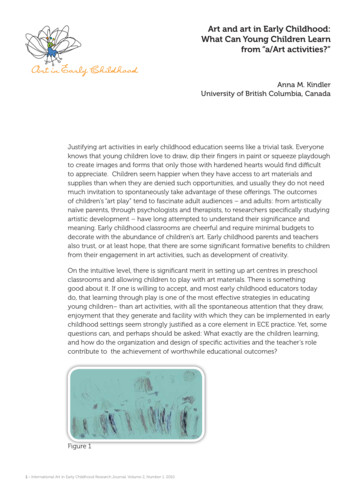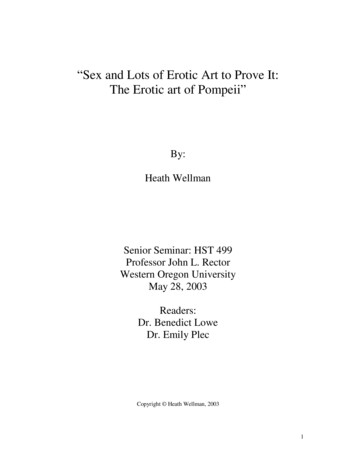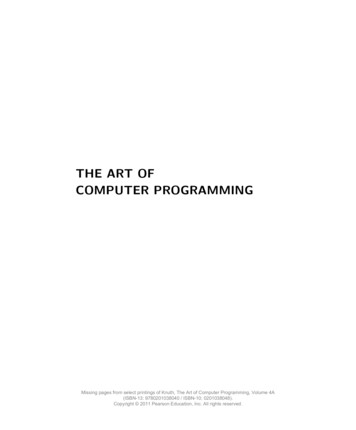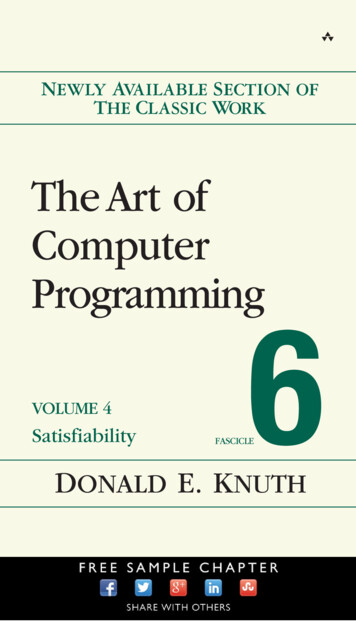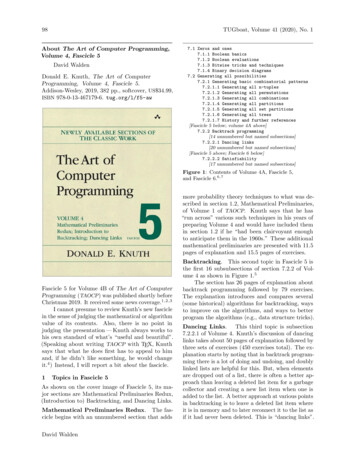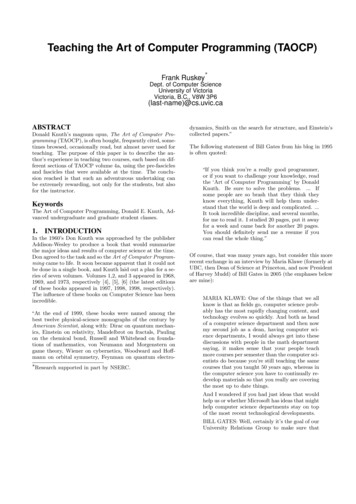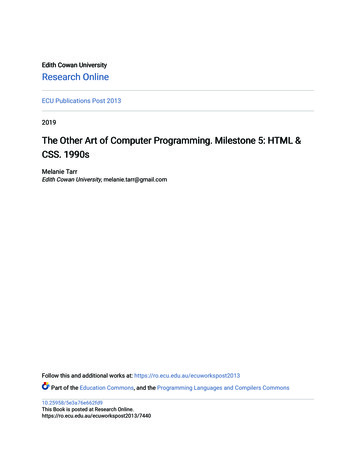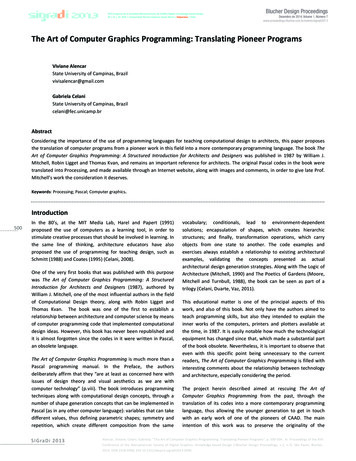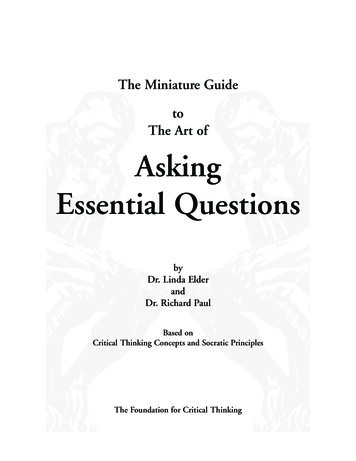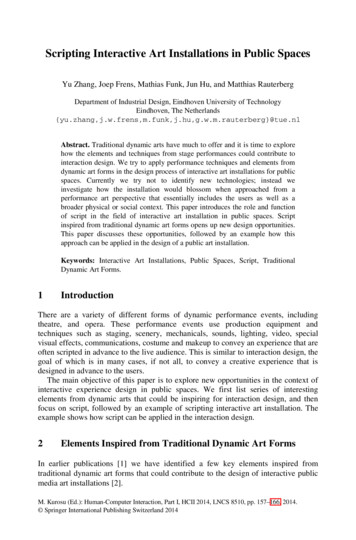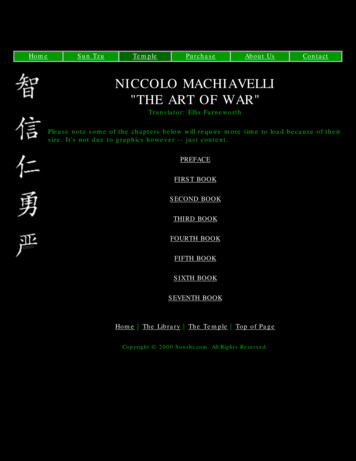
Transcription
HomeSun TzuTemplePurchaseAbout UsContactNICCOLO MACHIAVELLI"THE ART OF WAR"Translator: Ellis FarneworthPlease note some of the chapters below will require more time to load because of theirsize. It's not due to graphics however -- just content.PREFACEFIRST BOOKSECOND BOOKTHIRD BOOKFOURTH BOOKFIFTH BOOKSIXTH BOOKSEVENTH BOOKHome The Library The Temple Top of PageCopyright 2000 Sonshi.com. All Rights Reserved.
HomeSun TzuTemplePurchaseAbout UsContactNICCOLO MACHIAVELLI"THE ART OF WAR"PREFACETable of Contents The Library NextMany, Lorenzo, have held and still hold the opinion, that there is nothing which hasless in common with another, and that is so dissimilar, as civilian life is from themilitary. Whence it is often observed, if anyone designs to avail himself of anenlistment in the army, that he soon changes, not only his clothes, but also hiscustoms, his habits, his voice, and in the presence of any civilian custom, he goes topieces; for I do not believe that any man can dress in civilian clothes who wants to bequick and ready for any violence; nor can that man have civilian customs and habits,who judges those customs to be effeminate and those habits not conducive to hisactions; nor does it seem right to him to maintain his ordinary appearance and voicewho, with his beard and cursing, wants to make other men afraid: which makes suchan opinion in these times to be very true. But if they should consider the ancientinstitutions, they would not find matter more united, more in conformity, and which, ofnecessity, should be like to each other as much as these (civilian and military); for inall the arts that are established in a society for the sake of the common good of men,all those institutions created to (make people) live in fear of the laws and of Godwould be in vain, if their defense had not been provided for and which, if wellarranged, will maintain not only these, but also those that are not well established.And so (on the contrary), good institutions without the help of the military are notmuch differently disordered than the habitation of a superb and regal palace, which,even though adorned with jewels and gold, if it is not roofed over will not haveanything to protect it from the rain. And, if in any other institutions of a City and of aRepublic every diligence is employed in keeping men loyal, peaceful, and full of thefear of God, it is doubled in the military; for in what man ought the country look forgreater loyalty than in that man who has to promise to die for her? In whom oughtthere to be a greater love of peace, than in him who can only be injured by war? Inwhom ought there to be a greater fear of God than in him who, undergoing infinitedangers every day, has more need for His aid? If these necessities in forming the lifeof the soldier are well considered, they are found to be praised by those who gave thelaws to the Commanders and by those who were put in charge of military training, andfollowed and imitated with all diligence by others.But because military institutions have become completely corrupt and far removedfrom the ancient ways, these sinister opinions have arisen which make the militaryhated and intercourse with those who train them avoided. And I, judging, by what Ihave seen and read, that it is not impossible to restore its ancient ways and returnsome form of past virtue to it, have decided not to let this leisure time of mine pass
without doing something, to write what I know of the art of war, to the satisfaction ofthose who are lovers of the ancient deeds. And although it requires courage to treat ofthose matters of which others have made a profession, none the less, I do not believethat it is a mistake to occupy a position with words, which may, with greaterpresumption, have been occupied with deeds; for the errors which I should make inwriting can be corrected without injury to anyone, but those which are made withdeeds cannot be found out except by the ruin of the Commanders.You, Lorenzo, will therefore consider the quality of these efforts of mine, andwill give in your judgement of them that censure or praise which will appearto you to be merited. I send you these, as much as to show myself gratefulfor all the benefits I have received from you, although I will not include inthem the (review) of this work of mine, as well as also, because beingaccustomed to honor similar works of those who shine because of theirnobility, wealth, genius, and liberality, I know you do not have many equalsin wealth and nobility, few in ingenuity, and no one in liberality.Table of Contents NextHome The Library The Temple Top of PageCopyright 2000 Sonshi.com. All Rights Reserved.
HomeSun TzuTemplePurchaseAbout UsContactNICCOLO MACHIAVELLI"THE ART OF WAR"FIRST BOOKTable of Contents The Library NextAs I believe that it is possible for one to praise, without concern, any man after he isdead since every reason and supervision for adulation is lacking, I am notapprehensive in praising our own Cosimo Ruccelai, whose name is never rememberedby me without tears, as I have recognized in him those parts which can be desired in agood friend among friends and in a citizen of his country. For I do not know whatpertained to him more than to spend himself willingly, not excepting that courage ofhis, for his friends, and I do not know of any enterprise that dismayed him when heknew it was for the good of his country. And I confess freely not to have met amongso many men whom I have known and worked with, a man in whom there was a mindmore fired with great and magnificent things. Nor does one grieve with the friends ofanother of his death, except for his having been born to die young unhonored withinhis own home, without having been able to benefit anyone with that mind of his, forone would know that no one could speak of him, except (to say) that a good friendhad died. It does not remain for us, however, or for anyone else who, like us, knewhim, to be able because of this to keep the faith (since deeds do not seem to) to hislaudable qualities. It is true however, that fortune was not so unfriendly to him that itdid not leave some brief memory of the dexterity of his genius, as was demonstratedby some of his writings and compositions of amorous verses, in which (as he was notin love) he (employed as an) exercise in order not to use his time uselessly in hisjuvenile years, in order that fortune might lead him to higher thoughts. Here, it can beclearly comprehended, that if his objective was exercise, how very happily hedescribed his ideas, and how much he was honored in his poetry. Fortune, however,having deprived us of the use of so great a friend, it appears to me it is not possible tofind any other better remedy than for us to seek to benefit from his memory, andrecover from it any matter that was either keenly observed or wisely discussed. Andas there is nothing of his more recent than the discussions which the Lord FabrizioColonna had with him in his gardens, where matters pertaining to war were discussedat length by that Lord, with (questions) keenly and prudently asked by Cosimo, itseemed proper to me having been present with other friends of ours, to recall him tomemory, so that reading it, the friends of Cosimo who met there will renew in theirminds the memory of his virtue, and another part grieving for not having been there,will learn in part of many things discussed wisely by a most sagacious man useful notonly to the military way of life, but to the civilian as well. I will relate, therefore, howFabrizio Colonna, when he returned from Lombardy where he had fought a long timegloriously for the Catholic King, decided to pass through Florence to rest several daysin that City in order to visit His Excellency the Duke, and see again several gentlemen
with whom he had been familiar in the past. Whence it appeared proper to Cosimo toinvite him to a banquet in his gardens, not so much to show his generosity as to havereason to talk to him at length, and to learn and understand several things from him,according as one can hope to from such a man, for it appeared to him to give him anopportunity to spend a day discussing such matters as would satisfy his mind.Fabrizio, therefore, came as planned, and was received by Cosimo together withseveral other loyal friends of his, among whom were Zanobi Buondelmonti, BattistaDella Palla, and Luigi Alamanni, young men most ardent in the same studies and lovedby him, whose good qualities, because they were also praised daily by himself, we willomit. Fabrizio, therefore, was honored according to the times and the place, with allthe highest honors they could give him. As soon as the convivial pleasures were pastand the table cleared and every arrangement of feasting finished, which, in thepresence of great men and those who have their minds turned to honorable thoughtsis soon accomplished, and because the day was long and the heat intense, Cosimo, inorder to satisfy their desire better, judged it would be well to take the opportunity toescape the heat by leading them to the more secret and shadowy part of his garden:when they arrived there and chairs brought out, some sat on the grass which wasmost fresh in the place, some sat on chairs placed in those parts under the shadow ofvery high trees; Fabrizio praised the place as most delightful, and looking especially atthe trees, he did not recognize one of them, and looked puzzled. Cosimo, becomingaware of this said: Perhaps you have no knowledge of some of these trees, but do notwonder about them, because here are some which were more widely known by theancients than are those commonly seen today. And giving him the name of some andtelling him that Bernardo, his grandfather, had worked hard in their culture, Fabrizioreplied: I was thinking that it was what you said I was, and this place and this studymake me remember several Princes of the Kingdom, who delighted in their ancientculture and the shadow they cast. And stopping speaking of this, and somewhat uponhimself as though in suspense, he added: If I did not think I would offend you, I wouldgive you my opinion: but I do not believe in talking and discussing things with friendsin this manner that I insult them. How much better would they have done (it is saidwith peace to everyone) to seek to imitate the ancients in the strong and ruggedthings, not in the soft and delicate, and in the things they did under the sun, not in theshadows, to adopt the honest and perfect ways of antiquity, not the false and corrupt;for while these practices were pleasing to my Romans, my country (without them) wasruined. To which Cosimo replied (but to avoid the necessity of having to repeat somany times who is speaking, and what the other adds, only the names of thosespeaking will be noted, without repeating the others). Cosimo, therefore, said: Youhave opened the way for a discussion which I desired, and I pray you to speak withoutregard, for I will question you without regard; and if, in questioning or in replying, Iaccuse or excuse anyone, it will not be for accusing or excusing, but to understand thetruth from you.FABRIZIO: And I will be much content to tell you what I know of all that you ask me;whether it be true or not, I will leave to your judgement. And I will be grateful if youask me, for I am about to learn as much from what you ask me, as you will from mereplying to you, because many times a wise questioner causes one to consider manythings and understand many others which, without having been asked, would neverhave been understood.COSIMO: I want to return to what you first were saying, that my grandfather andthose of yours had more wisely imitated the ancients in rugged things than in delicate
ones, and I want to excuse my side because I will let you excuse the other (your side).I do not believe that in your time there was a man who disliked living as softly as he,and that he was so much a lover of that rugged life which you praise: none the less herecognized he could not practice it in his personal life, nor in that of his sons, havingbeen born in so corrupted an age, where anyone who wanted to depart from thecommon usage would be deformed and despised by everyone. For if anyone in anaked state should thrash upon the sand under the highest sun, or upon the snow inthe most icy months of winter, as did Diogenes, he would be considered mad. Ifanyone (like the Spartan) should raise his children on a farm, make them sleep in theopen, go with head and feet bare, bathe in cold water in order to harden them toendure vicissitudes, so that they then might love life less and fear death less, hewould be praised by few and followed by none. So that dismayed at these ways ofliving, he presently leaves the ways of the ancients, and in imitating antiquity, doesonly that which he can with little wonderment.FABRIZIO: You have excused him strongly in this part, and certainly you speak thetruth: but I did not speak so much of these rugged ways of living, as of those othermore human ways which have a greater conformity to the ways of living today, whichI do not believe should have been difficult to introduce by one who is numberedamong the Princes of a City. I will never forego my examples of my Romans. If theirway of living should be examined, and the institutions in their Republic, there will beobserved in her many things not impossible to introduce in a Society where there yetmight be something of good.COSIMO: What are those things similar to the ancients that you would introduce?FABRIZIO: To honor and reward virtu, not to have contempt for poverty, to esteemthe modes and orders of military discipline, to constrain citizens to love one another,to live without factions, to esteem less the private than the public good, and othersuch things which could easily be added in these times. It is not difficult to persuade(people) to these ways, when one considers these at length and a
"THE ART OF WAR" PREFACE Table of Contents The Library Next Many, Lorenzo, have held and still hold the opinion, that there is nothing which has less in common with another, and that is so dissimilar, as civilian life is from the military. Whence it is often observed, if anyone designs to avail himself of an enlistment in the army, that he soon changes, not only his clothes, but also his .File Size: 787KBPage Count: 103
